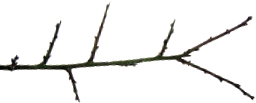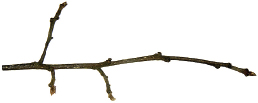If you have the time and the patience, identifying native deciduous trees and shrubs is not too daunting during periods of the year when there are leaves and flowers or fruits to help. But during the winter months, identification is considerably more challenging. Challenging, but not impossible, because the texture and colour of the twigs themselves and their buds, as well as the way in which they branch, all give clues to a tree’s identity.
Identifying winter twigs is not just an academic exercise. It can have practical applications too. Imagine, for example, that you want to cut back a native hedge (best done in the winter) but do not want to damage certain key tree and shrub species. Or you might want to undertake some woodland conservation work to remove alien species but leave notable native trees or shrubs untouched. Unless you had the foresight to identify and mark every tree and shrub back in the summer months, you will need to be able to recognise the trees and shrubs by their winter twigs alone. The following pages illustrate some of the more common and widespread native and widely naturalised trees and shrubs. For ease of reference, I have divided them into three sections: classic hedgerow shrubs and trees; woodland trees; and garden and park trees that are sometimes naturalised. Of course, these are artificial divisions so be aware, for example, that some hedgerow shrubs and trees may be found in woodland and vice versa.
OPPOSITE BUDS
![]()
ELDER Sambucus nigra
Curved, greyish and warty twigs with purplish buds.
![]()
GUELDER-ROSE Viburnum opulus
Straight, hairless and greyish, angled in cross section; buds scaly, reddish and paired. Terminal fruit stalk often persists.
![]()
WAYFARING-TREE Viburnum lantana
Straight, downy and yellowish brown, rounded in cross section; buds non-scaly, yellowish and paired.
![]()
SPINDLE Euonymus europaeus
Straight, stiff and greenish brown, slightly angled in cross section; buds paired, ovoid to conical and greenish brown.
![]()
DOGWOOD Cornus sanguinea
Straight, stiff and reddish, downy at first but then shiny; buds reddish and flattened-conical at first.
![]()
BUCKTHORN Rhamnus cathartica
Straight and greyish to yellowish brown; buds conical to talon-like, reddish brown and in slightly staggered, opposite pairs.

BLACKTHORN Prunus spinosa
Straight and stiff, purplish and shiny but often coated with a bloom of green algae; side shoots terminate in sharp spines. Buds small, reddish and ovoid.
WILD PRIVET Ligustrum vulgare
Straight and greyish to yellowish brown, and slightly rough; buds reddish green, ovoid and borne in staggered, opposite pairs.
![]()
FIELD MAPLE Acer campestre
Straight to slightly curved, greyish to yellowish brown; buds paired, yellowish brown with greyish hairs.
ALTERNATE BUDS
![]()
COMMON HAWTHORN Crataegus monogyna
Stiff, reddish brown or greenish with 1–2cm spines and knobbly brown buds.
![]()
MIDLAND HAWTHORN Crataegus laevigata
Similar to Common Hawthorn but twigs less stiff and less spiny (often spineless).

HAZEL Corylus avellana
Mainly straight (but sometimes zigzag towards tip, between nodes), greenish brown and sparsely hairy; buds green and ovoid. Male catkins usually present by mid-January; tiny reddish female flowers sessile.

ALDER BUCKTHORN Frangula alnus
Straight, with side branches widely spreading, purplish brown with white streaks created by elongated lenticels; buds alternate and scale-less, with tufts of orange hairs.
![]()
WEEPING WILLOW Salix × sepulcralis
Straight and pendulous, greyish at first but yellowish later (golden in some cultivars); buds yellowish and narrow-conical to talon-like.
![]()
CRACK WILLOW Salix fragilis
Straight, yellowish brown or reddish, and downy at first but soon hairless and shiny; buds narrow, flattened and smooth.

GOAT WILLOW Salix caprea
Greyish to yellowish brown with a rough texture at first, but smooth later; buds yellowish, ovoid to clog-like, and rather congested towards the shoot tip.
![]()
WHITE WILLOW Salix alba
Slender, straight and greyish, downy at first but smooth later; buds flattened and silky.
ENGLISH ELM Ulmus procera
Slender and downy; often zigzag at the nodes. Buds tiny, and ovoid to spherical.

WYCH ELM Ulmus glabra
Dark greyish brown with coarse hairs; twigs often look knobbly and are not straight, with side shoots often reflexed. Buds tiny and dark brown.
OPPOSITE BUDS

SYCAMORE Acer pseudoplatanus
Reddish brown, often tinged greenish, marked with lenticels; buds ovoid, swollen and greenish.
![]()
NORWAY MAPLE Acer platanoides
Yellowish grey to pinkish brown, smooth with lenticels; buds ovoid and reddish.

HORSE-CHESTNUT Aesculus hippocastanum
Thick and straight, reddish grey and marked with horseshoe-shaped leaf scars; buds reddish brown, pointed and sticky.
![]()
ASH Fraxinus excelsior
Stout and greyish, swollen below buds, and sometimes yellowish there; buds blackish and mitre-shaped.
ALTERNATE BUDS

ASPEN Populus tremula
Straight between nodes, but overall rather arching, yellowish brown and shiny eventually; buds long and sharply pointed.

BLACK-POPLAR Populus nigra ssp. betulifolia
Knobbly and irregular, greyish in older sections of twigs but new growth yellowish; buds yellowish brown and sharply pointed.
![]()
GREY POPLAR Populus × canescens
Rather irregular, yellowish grey, downy at first but soon smooth and shiny; buds yellowish brown, narrow and very sharply pointed.
SILVER BIRCH Betula pendula
Yellowish to purplish brown and hairless, although white warts create a rough texture; buds ovoid and pointed, greenish and reddish brown.

SILVER BIRCH Betula pendula
Catkins appear on bare twigs by late winter; male and female flowers in separate catkins.
![]()
DOWNY BIRCH Betula pubescens
Yellowish brown to purplish, with downy hairs especially towards shoot tips; buds ovoid and greenish and reddish brown.
![]()
SWEET CHESTNUT Castanea sativa
Greyish yellow with a few, elongated lenticels, swollen below the buds; buds yellowish red, swollen and pointed.
![]()
SMALL-LEAVED LIME Tilia cordata
Straight between nodes but zigzagging, shiny and reddish; buds swollen and reddish.
![]()
LIME Tilia × europaea
Reddish to yellowish brown, hairless and shiny; buds ovoid to spherical, swollen and reddish.
![]()
COMMON WHITEBEAM Sorbus aria
Yellowish to reddish, or greyish in shade, downy at first but soon hairless and shiny; buds ovoid, the reddish-brown scales tipped with greyish hairs.
![]()
ROWAN Sorbus aucuparia
Yellowish brown to purplish, downy at first but soon smooth; buds conical and purplish brown but scales have long, greyish hairs.
![]()
WILD SERVICE-TREE Sorbus torminalis
Slender, shiny and yellowish to greyish brown; buds green and spherical to ovoid.
![]()
WILD CHERRY Prunus avium
Rather straight, yellowish brown but with a grey bloom; buds narrow-conical and yellowish to purplish brown.
![]()
BIRD CHERRY Prunus padus
Greyish brown with paler, elongated lenticels; buds narrow, elongated and pointed.

CRAB APPLE Malus sylvestris
Greyish brown or yellowish, hairless and shiny; buds ovoid and reddish brown, with downy tips.
HORNBEAM Carpinus betulus
Slender and irregular, hairy at first but soon smooth; buds slender and pointed.

PEDUNCULATE OAK Quercus robur
Greyish to pale purplish and often rather knobbly; buds orange-brown and ovoid.

SESSILE OAK Quercus petraea
Similar to Pedunculate Oak but more slender; greyish to pale purplish and often rather knobbly; buds buffish brown, ovoid and rather scaly.

BEECH Fagus sylvatica
Slender and greyish brown, zigzagging at nodes; buds extremely slender and pointed, and orange-brown.
![]()
COMMON ALDER Alnus glutinosa
Curved and yellowish grey, hairless with pale lenticels; buds purplish brown, mealy, ovoid and stalked, the result looking rather club-like.
ALTERNATE BUDS

CULTIVATED APPLE Malus domestica
Greyish, slightly hairy and often rather knobbly, irregular and gnarled-looking; buds pointed, with greyish woolly hairs.
![]()
COMMON PEAR Pyrus communis
Rather straight and shiny reddish brown; usually spineless (Wild Pear similar but spiny). Buds tiny, brown and pointed.

PLUM Prunus domestica ssp. domestica
Rather straight and reddish purple, downy at first but soon smooth; buds small, ovoid and clustered.

CHERRY PLUM Prunus cerasifera
Rather straight, greenish and hairless; buds tiny, ovoid and clustered.

LONDON PLANE Platanus × hispanica
Greenish and usually slightly curved; buds alternate, conical, smooth and green, tinged reddish.